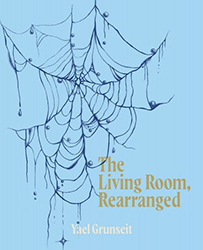Daniel Khalastchi attempts to defy the limits of language in his new collection of poetry, The Story of Your Obstinate Survival. The title comes from Moby Dick (“… there’s the story of your obstinate survival of old beliefs never bottomed on the earth …”), which suggests that the book will include poems about the struggle between opposites: old and new; perception and reality; order and chaos. That is, indeed, the case, and Khalastchi uses wordplay to accomplish that goal, inviting the reader into a world that is at once familiar and dystopian.
In the poem “The Imminent Decline of Everything We’ve Understood to Be What Governs Our Privileged Daily Lives,” the poet taunts his partner by suggesting that she will leave him for their neighbor. But what does the poet really know about the neighbor, other than he is recently separated from his wife, has a daughter, and just lost his job? The poem also takes place during the pandemic, and Khalastchi injects humor by mentioning that the neighbor has brought over his extra toilet paper. It’s not clear what might make the neighbor appealing to his wife, other than he represents Everyman during fairly desperate times.
At the end of the poem, the couple gives the neighbor a box of matzah for seder that turns out is not kosher for Passover. The neighbor is not concerned about that — another reason why not only the partner, but the poet himself should leave the relationship. The very meaning of seder is order — something that is clearly not revered in this narrative: “… We feel terrible//that the matzah we gave him/ wasn’t approved to be used//at the sacramental meal. It said so/on the box. But he wasn’t// bothered. Don’t you see why/we should leave me?”
Khalastchi uses wordplay throughout the book — putting words together in ways that don’t always make sense, but they are often jarring, funny, and musical. The awkward word choices suggest the subjects themselves might be difficult or complicated, such as in the poem, Postcard in Drawer, when the poet writes about a relationship between two people. The couple finally finds connectedness through time and space, via their individual breaths:
… In my
chest, my ribs don’t hold
nothing. Back home, I imagine you
swimming. You breathe,
and you pull
and we somehow get closer.
Although not all of the poems have overt Jewish themes, Khalastchi’s focus on words — what they mean, and the questions they ask — could itself be considered Jewish. The Torah teaches us that words are a gift from God. Jewish mysticism takes this one step further by suggesting that words are the building blocks of creation. Khalastchi wrestles with words as he might wrestle with God, choosing each one deliberately.
The idea of approaching God through words is evident in one of the last poems in the book, “Dayenu.” At the end of the poem, after pointing out that every step along the journey would have been sufficient, Khalastchi is hopeful that he will still meet God:
If you had pointed me home
and had not let me get there,
it would have been sufficient.
If you had let me get there.
If you had not been waiting.
The Story of Your Obstinate Survival is a challenging book, but reading each poem carefully and savoring Khalastchi’s fresh voice is well worth it.
Stewart Florsheim’s poetry has been widely published in magazines and anthologies. He was the editor of Ghosts of the Holocaust, an anthology of poetry by children of Holocaust survivors (Wayne State University Press, 1989). He wrote the poetry chapbook, The Girl Eating Oysters (2River, 2004). In 2005, Stewart won the Blue Light Book Award for The Short Fall From Grace (Blue Light Press, 2006). His collection, A Split Second of Light, was published by Blue Light Press in 2011 and received an Honorable Mention in the San Francisco Book Festival, honoring the best books published in the Spring of 2011. Stewart’s new collection, Amusing the Angels, won the Blue Light Book Award in 2022.





